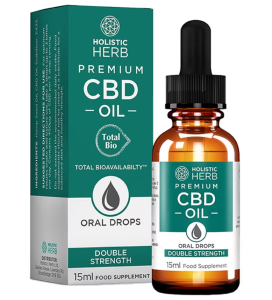The term “Best CBD brand” is subjective and varies depending on individual preferences, needs, and experiences. Condor CBD Gummies is a health supplement designed to deliver the benefits of CBD (cannabidiol) in a convenient, edible form. However, I can provide general information about what factors to consider when evaluating CBD brands and their products:
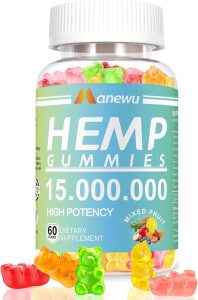
How does CBD work?
CBD, or cannabidiol, is a compound found in the cannabis plant. Unlike THC (tetrahydrocannabinol), another well-known compound from cannabis, CBD does not cause a “high.” Here’s a brief overview of how CBD works in the body:
- Interaction with the Endocannabinoid System (ECS):
- The human body has a complex system called the endocannabinoid system (ECS), which plays a role in regulating various physiological and cognitive processes. This includes pain sensation, mood, memory, appetite, and more.
- The ECS consists of endocannabinoids (cannabinoids produced by the body), cannabinoid receptors (primarily CB1 and CB2), and enzymes that synthesize and break down endocannabinoids.
- CBD interacts with the ECS, but unlike THC, it does not bind strongly to the CB1 or CB2 receptors. Its mechanisms of action are more indirect and are still being studied.
- Modulation of Various Receptors and Neurotransmitters:
- CBD may influence other receptors in the brain, such as serotonin receptors (involved in mood regulation) and vanilloid receptors (involved in pain modulation).
- It is also thought to affect the uptake or degradation of certain neurotransmitters like anandamide, which plays a role in pain regulation and mood.
- Potential Effects on Inflammation and Oxidative Stress:
- CBD has been studied for its potential anti-inflammatory properties and its ability to reduce oxidative stress, both of which are involved in many diseases.
- Neuroprotective Properties:
- Research suggests that CBD may have neuroprotective properties, potentially beneficial in neurological conditions like epilepsy and multiple sclerosis.
- Influence on the Immune System:
- CBD may have immunomodulatory effects, influencing the immune system’s response.
- Anxiety and Stress Reduction:
- Some studies suggest that CBD might help reduce anxiety and stress, potentially by altering the brain’s response to serotonin.
It’s important to note that while the potential therapeutic effects of CBD are promising, more research is needed to fully understand its mechanisms and efficacy in treating various conditions. Additionally, the way CBD is administered (such as orally, topically, or by inhalation) and its concentration can influence its effects on the body.
Key Ingredients
The key ingredients in CBD products can vary based on the type of product and its intended use. However, here are some common ingredients you might find in CBD products:
- Hemp Seed Oil: Derived from hemp plant seeds, rich in omega-3 and omega-6 fatty acids.
- MCT Oil (Medium-Chain Triglyceride): Often from coconut oil, easily absorbed.
- Olive Oil: Less common, known for health benefits and flavor.
- Flavorings: Added to improve taste, commonly found in CBD gummies, beverages, and sublingual tinctures.
- Terpenes: Aromatic compounds in hemp, contribute to flavor and aroma, and may have therapeutic effects.
- Additional Cannabinoids: Full-spectrum CBD contains various cannabinoids, including trace THC (<0.3% for legal compliance). Broad-spectrum CBD has multiple cannabinoids but is typically THC-free.
- Essential Oils and Herbal Extracts: Some CBD products are infused with essential oils or herbal extracts for added benefits, e.g., lavender for relaxation or arnica for pain relief.
- Vitamins and Supplements: Certain CBD products may include vitamins (e.g., B12 for energy, D for bone health) or other supplements to enhance health benefits.
- Preservatives and Stabilizers: Used in some CBD products to extend shelf life and maintain quality.
It’s important to read the label of any CBD product to understand its specific ingredients. This is especially crucial for individuals with allergies, sensitivities, or specific dietary requirements. Additionally, the quality of ingredients can greatly influence the effectiveness and safety of the product.
Reasons to Use
People use CBD for a variety of reasons, largely due to its potential therapeutic effects. Some of the most common reasons include:
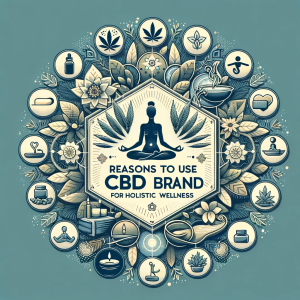
- Pain Relief: CBD can reduce inflammation and interact with neurotransmitters, easing chronic pain from conditions like arthritis, multiple sclerosis, and back pain.
- Anxiety and Stress Reduction: CBD may calm the brain and nervous system, aiding in managing anxiety, stress, and disorders like PTSD, potentially through serotonin receptors.
- Improved Sleep: CBD can enhance sleep quality, particularly for those with insomnia or sleep disruptions due to pain or anxiety.
- Anti-Inflammatory Effects: CBD’s anti-inflammatory properties are useful for addressing conditions like acne, psoriasis, and general bodily inflammation.
- Neuroprotective Properties: Research suggests CBD may protect against neurological disorders such as epilepsy and multiple sclerosis.
- Heart Health: Preliminary studies show CBD may lower blood pressure and reduce artery blockage, potentially benefiting heart health.
- Substance Abuse Treatment: CBD has the potential to treat substance abuse by modifying brain circuits related to addiction.
- Antipsychotic Effects: CBD is being explored as a treatment for conditions like schizophrenia, thanks to its possible antipsychotic effects.
- Cancer Symptom Relief: CBD can alleviate cancer-related symptoms and treat side effects like nausea, vomiting, and pain.
- General Wellness: Some use CBD in their wellness routine for overall health and well-being, similar to supplements.
It’s important to note that while anecdotal evidence and some scientific studies suggest these benefits, more research is needed to fully understand the efficacy and safety of CBD. Additionally, CBD’s effects can vary greatly between individuals, and it’s always recommended to consult a healthcare professional before using CBD, especially for those with existing health conditions or who are taking other medications.
How to Use?
CBD can be used in various forms, each with its own method of use. Here’s a guide to the most common forms of CBD and how to use them:
- CBD Oil and Tinctures: Quick absorption by placing drops under the tongue.
- CBD Capsules and Pills: Convenient, but slower absorption via digestion.
- CBD Edibles: Discreet, but effects take longer; check CBD content.
- CBD Topicals: Applied directly for localized relief; no bloodstream entry.
- CBD Vaping: Fast inhalation method; use vaping-specific products carefully.
- CBD Patches: Slow, consistent release for chronic conditions.
- CBD Beverages: Infused drinks are absorbed through digestion like regular beverages.
Dosage and Frequency:
- The appropriate dosage of CBD can vary widely depending on the individual, the form of CBD, the concentration, and the reason for use. It’s often recommended to start with a low dose and gradually increase it until you find what works best for you.
- Consistency is key with CBD; using it regularly can lead to more noticeable and lasting effects.
Safety and Precautions:
- It’s important to choose high-quality CBD products from reputable sources.
- Be aware of potential interactions with other medications. Consult with a healthcare provider, especially if you have underlying health conditions or are taking other medications.
- The method of use may depend on specific health goals or personal preferences.
Remember, the efficacy of CBD and the optimal way to use it can vary from person to person, and more research is needed to fully understand its benefits and risks.
Who Can Use?
CBD is generally considered safe for use by most adults, but there are specific groups of people who should be more cautious or consult with a healthcare provider before using CBD:
- Adults with Chronic Conditions: Seek healthcare guidance, especially when using other medications.
- Older Adults: Consult a healthcare provider due to potential interactions and sensitivity.
- Athletes: Use third-party tested CBD for recovery, pain, and stress management.
- People with Mental Health Disorders: Consider CBD as a supplement, not a replacement, under professional advice.
- Those Exploring Alternative Therapies: CBD can be an option for natural health solutions.
Who Should Be Cautious:
- Pregnant and Breastfeeding Women: Generally advised to avoid CBD due to unclear effects on fetal development and infants.
- Children: Consult a pediatrician before giving CBD to children, except for specific FDA-approved conditions.
- Individuals with Liver Disease: Consult a healthcare provider if you have liver disease or take liver-affecting medication, as CBD can impact liver enzymes.
- People Taking Specific Medications: Consult a healthcare provider when using CBD alongside medications like blood thinners, certain antidepressants, or those with grapefruit warnings, as interactions may occur.
As with any supplement or treatment, each needs to consider their unique health circumstances and needs. Consulting with a healthcare provider before starting CBD, particularly for those with existing health conditions or who are taking other medications, is always a good practice.
Who Should Avoid?
BD is generally considered safe for use by most adults, but there are specific groups of people who should be more cautious or consult with a healthcare provider before using CBD:
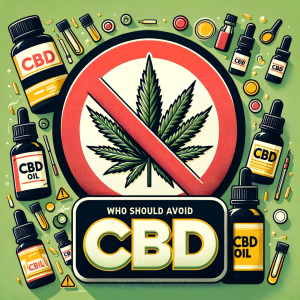
- Adults with Chronic Conditions: Consult a healthcare provider, especially when using other medications. it’s important to discuss with a healthcare provider, especially if these conditions are being managed with other medications.
- Older Adults: Seek healthcare guidance for pain, inflammation, and sleep issues due to potential drug interactions and sensitivity. Due to the different forms of the body supply and the sensitivity of older bodies to supplements, a consultation with a healthcare provider is advisable.
- Athletes: Use third-party tested CBD for muscle recovery, pain, and stress, avoiding THC and prohibited substances. It should not replace prescribed medications or therapies unless advised by a health
- People with Mental Health Disorders: Use CBD as a supplement, not a replacement, under professional guidance for anxiety or depression.
- Individuals Exploring Alternative Therapies: Consider CBD for natural health solutions. People interested in natural or alternative therapies for various health issues might consider CBD as an option.
Who Should Be Cautious:
- Pregnant and Breastfeeding Women: The effects of CBD on fetal development or breastfed infants are not well understood. Therefore, it is generally advised to avoid CBD during pregnancy and breastfeeding.
- Children: The safety and efficacy of CBD in children are not well established, except for specific FDA-approved conditions like certain types of epilepsy. Always consult a pediatrician before giving CBD to a child.
- Individuals with Liver Disease: CBD can affect liver enzymes and may alter the metabolism of other drugs. Those with liver disease or taking medication that affects the liver should consult a healthcare provider before using CBD.
- People Taking Certain Medications: CBD can interact with certain medications, such as blood thinners, some antidepressants, and medications that carry a grapefruit warning. Consult with a healthcare provider for guidance.
As with any supplement or treatment, each needs to consider their unique health circumstances and needs. Consulting with a healthcare provider before starting CBD, particularly for those with existing health conditions or who are taking other medications, is always a good practice.
Who Should Avoid?
Certain individuals should exercise caution or avoid using CBD due to potential risks, interactions with other medications, or lack of research on its effects in specific populations. These groups include:
- Pregnant and Breastfeeding Women: Generally avoid CBD due to limited research on fetal development and breastfeeding infants.
- Children: Consult a pediatrician before using CBD, except for FDA-approved uses like epilepsy.
- Individuals with Certain Medical Conditions: Discuss with a healthcare provider, especially for liver or immune system-related issues.
- People Taking Certain Medications: Consult a healthcare provider, as CBD can interact with medications.
- People with Allergies to Cannabinoids: If known allergies exist, avoid CBD products.
- Individuals Scheduled for Surgery: Stop CBD usage before surgery due to potential effects on blood clotting; consult a healthcare provider.
- People with a History of Substance Abuse: Seek professional advice before using CBD.
- Individuals with Mental Health Disorders: Use CBD cautiously; it should not replace prescribed treatments without professional guidance.
It’s always a good practice to consult with a healthcare provider before starting any new supplement, including CBD, particularly for individuals with existing health conditions or concerns.
Considerations
When considering the use of CBD products, there are several important factors to keep in mind to ensure safety, quality, and effectiveness. Here are key considerations:
- Trust & Transparency: Opt for reliable brands that openly communicate about their products. The communication from the CBD brand is transparent. it is trustworthy and provides clear information about the product.
- Product Variety: Look for brands offering diverse CBD products to match your preferences. Having a diverse product range can enhance the overall experience and effectiveness of a CBD brand for consumers seeking holistic wellness solutions.
- Natural Ingredients: Choose brands with natural and organic ingredients for holistic wellness.
- Third-Party Testing: Ensure independent lab testing to verify product quality. It ensures the trance-prance and has a different brand for the product to meet the claim the CBD concentration is free from contaminants.
- User Reviews: Check feedback from users to assess product effectiveness.
- Dosage Flexibility: Prefer products allowing customized CBD dosages.
- Professional Consultation: Consult healthcare professionals for guidance before using CBD for holistic wellness. Emphasizes the importance of seeking guidance from healthcare professionals before incorporating CBD into your holistic wellness routine
In summary, while a higher cost can sometimes indicate higher quality, this is not always the case. It’s essential to balance cost with quality, potency, and purity to find the best value CBD product for your needs.
Customer Satisfaction and Refund Policy
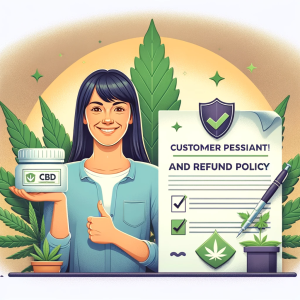
- Refund Policy:
- A clear, fair refund policy is a sign of a confident and customer-focused company. Look for details about the circumstances under which refunds are offered, such as dissatisfaction with the product or receiving a damaged product.
- Check the time frame for eligible returns or refunds. Some companies offer a 30-day money-back guarantee, while others may have different time frames.
- Exchange Options:
- Some companies may offer exchanges in addition to refunds, which can be useful if you want to try a different product or potency.
- Terms and Conditions:
- Read the terms and conditions associated with refunds and returns. This includes how to initiate a return, whether the product needs to be unopened, and who covers the return shipping costs.
- Some companies require the product to be in its original packaging and in the same condition as when received.
- Customer Service Accessibility:
- Evaluate the company’s customer service options and accessibility. A good CBD company should have a responsive customer service team that can be reached via email, phone, or live chat.
- Check how the company handles customer complaints and inquiries, as this can be indicative of their overall customer service quality.
- Transparency:
- Companies that are transparent about their products, ingredients, and manufacturing processes are often more reliable. Transparency can build trust and customer satisfaction.
- User Experiences:
- Look for user experiences and testimonials specific to the return and refund process. This can give you an idea of how easy or difficult it is to get a refund or exchange a product.
- Reputation:
- The company’s reputation in the market can also be a good indicator of customer satisfaction. Brands with a strong, positive reputation are often more likely to have customer-friendly policies.
Remember, a company’s refund and customer satisfaction policies can be a reflection of their confidence in their product and their commitment to customer service. Always read these policies carefully before making a purchase.
User Experiences
User experiences with CBD products can provide valuable insights into their effectiveness, quality, and potential benefits or drawbacks. Here are several aspects to consider when exploring user experiences:
- Effectiveness: Seek user testimonials covering pain relief, anxiety, sleep, etc., and consider both positive and negative reviews.
- Product Quality: Look for comments on taste, consistency, packaging, and overall satisfaction.
- Side Effects: Check for reported side effects like drowsiness, dry mouth, or appetite changes.
- Dosage and Usage: Find insights into effective dosages and usage methods, especially useful for newcomers.
- Customer Service: Consider experiences with ordering, shipping, responsiveness, and returns/refunds.
- Value for Money: Gauge cost-effectiveness through user feedback on whether the product justifies its price.
- Comparison with Other Products: Look for comparisons with other CBD products for context.
- Personal Stories: Explore personal anecdotes for deeper insights into CBD’s effects on various conditions.
- Variability of Experiences: Recognize that individual differences can lead to diverse experiences.
- Long-Term Use: Look for feedback from long-term users regarding sustained benefits.
- Authenticity of Reviews: Ensure reviews are genuine and unbiased, preferably from independent sources.
- Demographic and Condition-Specific Feedback: Pay attention to feedback from users with similar demographics or health conditions as yourself.
User experiences are a valuable resource when researching CBD products, but remember that individual responses to CBD can vary greatly. It’s always advisable to approach these experiences as one of many factors in your decision-making process.
Expert Insights
Expert insights on CBD are valuable for understanding its potential health benefits, safety profile, and appropriate usage. Here are some key insights from various experts in the field:
- Medical Professionals: Emphasize CBD in overall health strategies but advise caution, especially for those with existing health conditions or medication interactions.
- Pharmacological Researchers: Highlight CBD’s interaction with the endocannabinoid system and the need for more research to understand its full potential.
- Clinical Trials: Show CBD’s effectiveness for conditions like epilepsy but stress the need for further investigation in other areas.
- Regulatory Experts: Discuss CBD’s legal status, quality assurance, and the importance of industry standards and testing.
- CBD Industry Experts: Explain production processes and product types, like full-spectrum and isolate.
- Nutritional Experts: Offer advice on integrating CBD into wellness routines and considering entire product ingredients.
- Mental Health Professionals: Note CBD’s potential benefits for mental health but stress that it should complement conventional treatments.
- Consumer Advocacy Groups: Provide independent product testing and reviews.
- Legal Experts: Offer guidance on the evolving legal landscape of CBD.
When seeking expert insights on CBD, it’s crucial to consult a range of sources to get a well-rounded understanding. The field of CBD research and regulation is continually evolving, so staying updated with the latest information and guidelines is important.
Holistic Herb Premium CBD Oil Double-Strength
Positive points
- High Potency: Offers potent CBD concentration for potential therapeutic benefits. The higher concentration or strength of CBD compared to standard or lower-potency products.
- Natural Ingredients: Contains organic, natural ingredients for a holistic approach.
- Versatility: Suitable for various uses like pain relief, anxiety management, or sleep improvement.
- Trusted Brand: The reputation of Holistic Herb adds to product credibility. Trusted brands will have a different demonstration and commit to environmental and social responsibility.
- Positive Reviews: User feedback supports the product’s effectiveness.
- Lab Testing: Third-party testing ensures quality and transparency.
- Satisfaction Guarantee: Provides buyer reassurance.
- Easy Administration: Convenient dosing and use.
- Effective Packaging: User-friendly presentation.
Negative points
- Higher Cost: Double-strength CBD products can be expensive.
- Strong Taste: Concentrated CBD can result in a stronger, potentially unpleasant flavor.
- Possible Side Effects: Users may experience side effects like drowsiness, dry mouth, or digestive issues.
- Variable Efficacy: Effectiveness may vary among individuals.
- Limited Availability: Double-strength CBD oils may not be as readily available.
- Medication Interaction: CBD can interact with certain medications, requiring caution.
- Misuse Risk: Some users may misuse high-potency CBD products, seeking stronger effects.
Neutral Points
- Concentration: It contains a higher CBD concentration, which can be viewed neutrally, depending on the user’s needs.
- Customizable Dosage: The higher potency allows users to customize their CBD dosage more precisely. Customizable dosage offers flexibility, users should exercise caution and start with lower doses when beginning with CBD to avoid potential side effects
- Potential Effectiveness: While it may offer enhanced benefits for some, it might not be necessary or suitable for all users.
- Taste Preference: The stronger taste may be neutral or preferred by some individuals who enjoy the natural flavor of CBD.
- Product Availability: Depending on the market, availability may vary, with some users finding it easily accessible while others may not. Availability also affects competition among brands and retailers, as those with better distribution networks and stock management often have an advantage in meeting consumer demand.
- Tolerance Management: Users can manage tolerance by adjusting their dosage, which can be seen as a positive or neutral aspect.
- Potential Side Effects: Like any CBD product, it may or may not cause side effects for a particular user, making it a neutral consideration.
Final Thoughts
- Holistic Herb Premium CBD Oil Double-Strength is a game-changer for holistic wellness.
- Its double-strength formula provides a potent dose of CBD, perfect for stress relief and relaxation.
- The premium quality of CBD oil, sourced from top-notch hemp plants, ensures effectiveness.
- Incorporating it into your daily routine can help maintain balance and calmness.
- Holistic Herb is the go-to choice if you’re seeking high-quality CBD for overall well-being.
Conclusion
In conclusion, CBD (cannabidiol) has emerged as a popular natural remedy for various health conditions, but it’s important to approach its use with informed caution and understanding:
- Potential Benefits: CBD is used for a range of purposes, including pain relief, anxiety and stress reduction, improvement of sleep quality, and potential neuroprotective properties. However, the effectiveness can vary between individuals.
- Safety and Side Effects: Generally considered safe, CBD may still cause side effects like drowsiness, dry mouth, or changes in appetite in some individuals. Long-term effects are still being studied.
- Quality and Regulation: The CBD market varies in quality and regulation. Look for products that are third-party tested, with clear information about CBD concentration and a Certificate of Analysis (COA).
- Legal Considerations: The legality of CBD differs across regions, with most places requiring products to contain less than 0.3% THC.
- Medical Consultation: It’s crucial to consult healthcare professionals before using CBD, especially for individuals with existing health conditions or those on other medications.
- Research and Education: Stay informed through credible sources and ongoing research, as the field is rapidly evolving with new studies and findings.
- Personalized Approach: Consider personal health goals, preferences, and reactions when choosing CBD products. What works for one person may not work for another.
- Customer Experience: User reviews, customer satisfaction, and company transparency can guide purchasing decisions.
- Cost vs. Quality: Balance cost considerations with the quality and purity of products. Higher prices do not always equate to better quality.
Remember, while CBD holds promise, it’s not a cure-all. Its use should be part of a holistic approach to health and wellness, complementing other lifestyle choices and medical treatments as appropriate. As with any supplement or health product, individual experiences and needs should guide its use.
Review: Unlocking Holistic Wellness: The Potent Power of Holistic Herb CBD Oil
User: Harper Lewis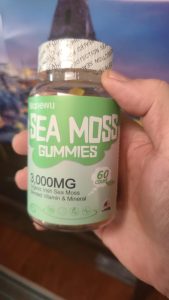
Holistic Herb Premium CBD Oil Double-Strength is a game-changer for holistic wellness. Its potency and premium quality make it highly effective for stress relief and relaxation.
Rating: 4.7/5
Review Transforming Wellness: The Power of Holistic Herb Double-Strength CBD Oil.
User: William Clark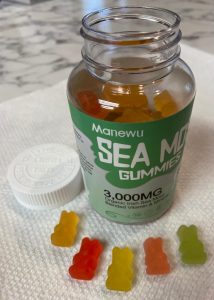
Holistic Herb Premium CBD Oil offers potent stress relief and relaxation, backed by high-quality sourcing. A daily essential for maintaining balance and well-being.
Rating:4.6/5

Welcome to GummiesInfo.com, your go-to hub for all things gummy, curated by yours truly, Jimmy Chamberlin. With an unbridled passion for wellness and a relentless curiosity about gummies, I’m here to provide insightful guides that make your journey to better health both flavorful and enjoyable. My foray into health and wellness began as a mission to find practical, enjoyable ways to enhance well-being.
This odyssey led me to dive deep into the realm of gummies, exploring their benefits, ingredients, and impact on health. GummiesInfo.com stands apart through my hands-on approach. I won’t settle for superficial knowledge – I dig deep to uncover the finest gummy options. By scrutinizing ingredients, evaluating formulations, and conducting real-world tests, I’m here to guide you toward optimal choices. From gummy essentials to detailed health-specific insights like immunity, energy, and relaxation, GummiesInfo.com is your trusted companion. Join me in discovering the potential of gummies – together; we’ll journey towards wellness, one flavorful gummy at a time.
Yours in wellness,
Jimmy Chamberlin
